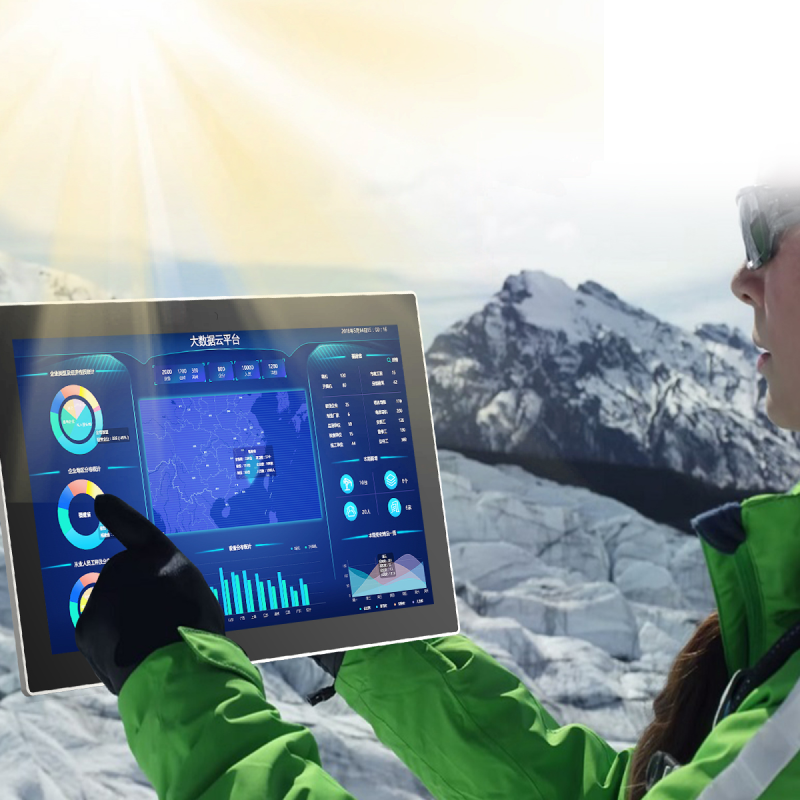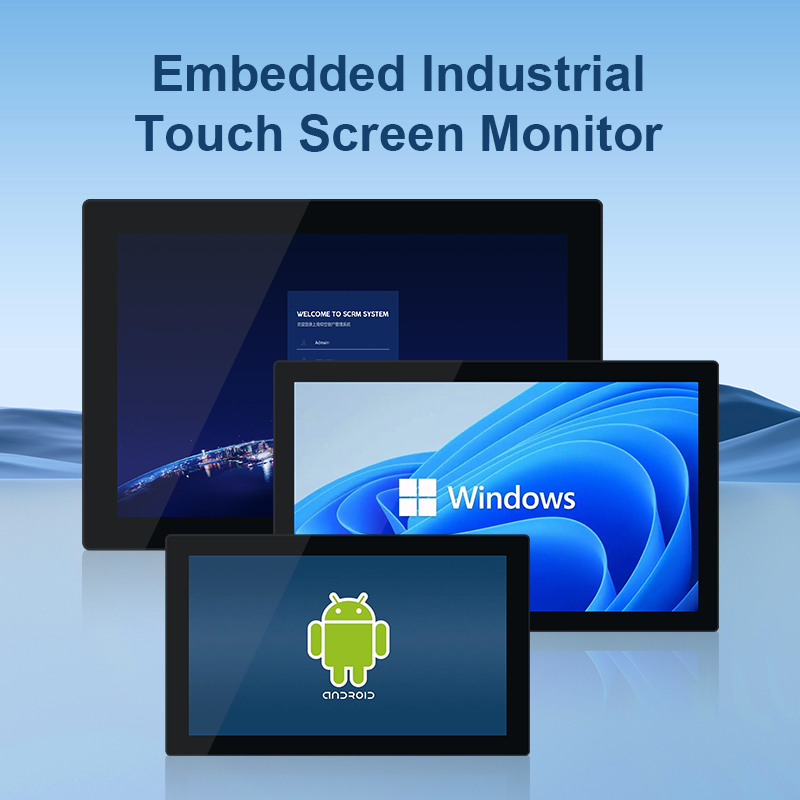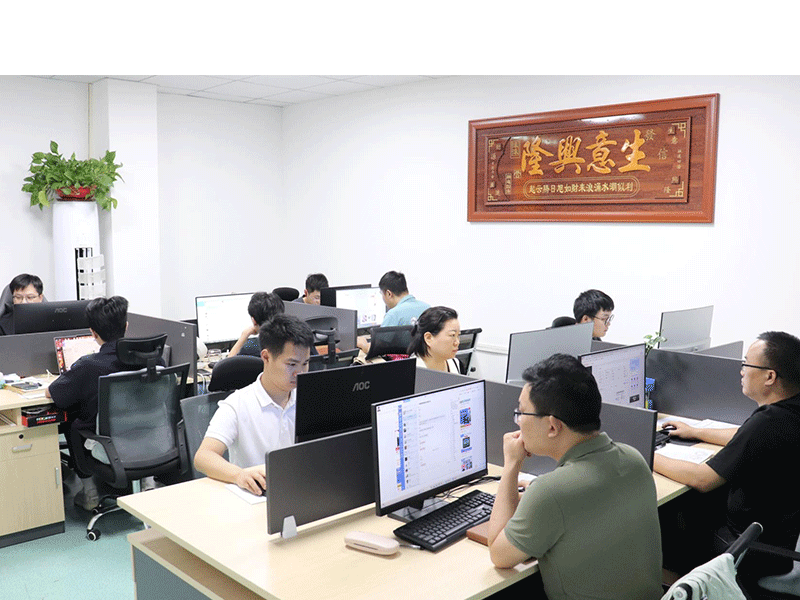Concept and importance of industrial panel pc
Uinda Industrial Panel PC (IPC) is a high-performance device that integrates an industrial computer with a monitor, usually equipped with touchscreen functionality, to operate reliably in complex and demanding industrial environments. Compared to traditional computers, Uinda Industrial Panel PCs are ruggedly designed to be dust-, water-, and shock-resistant, and are tailored for use in factories, production lines, warehouses, and other scenarios. It not only saves space, but also simplifies the installation and maintenance of equipment, playing a vital role in the development of modern industrial automation and intelligence.
Definition of Industrial Panel PC
An industrial tablet PC is a ruggedised computer device specially designed for industrial environments. It usually integrates a display, touch screen, processor, memory, storage device and various input/output interfaces, etc. It can operate stably in harsh industrial environments and realise the functions of monitoring, controlling, data acquisition and processing of industrial production processes. These devices are able to operate stably under harsh conditions, such as high temperature, dust, vibration or humidity, making them ideal for use in production lines, warehouses, factories and other industrial locations. It not only performs complex computing tasks, but also enables direct control and monitoring of production equipment through a touch screen and external sensors.
Differences between industrial panel pc and traditional computers
The main difference between an industrial panel pc and a traditional office or home computer is its durability and specially designed hardware construction:
1. Ruggedness
The industrial panel pc is designed with a rugged enclosure that is able to withstand shock, vibration, dust, moisture and other harsh environmental factors. It is able to withstand the extreme temperatures, dust and vibration of industrial environments, where traditional computers are usually unable to operate stably for long periods of time. Traditional computers are usually designed for milder office environments and have a relatively weak ability to adapt to the environment.
Industrial panel PCs have higher levels of protection, such as IP65, IP67, etc., which protects them from water and dust intrusion. Traditional computers generally do not have such protection.
2. Anti-interference ability
There are a variety of electromagnetic interference in the industrial environment, industrial panel pc after special electromagnetic compatibility design, can effectively resist interference, to ensure stable operation. Traditional computers are relatively weak in anti-interference performance.
Industrial panel pc usually adopts industrial grade electronic components, which has higher reliability and stability.
3. Integrated design
industrial panel pc integrates the computer and monitor in a single device, saving space, while traditional computers usually require separate monitors and hosts.
Touch screen capability: Most INDUSTRIAL PANEL PCs have a touch screen, which facilitates direct operator interaction, whereas traditional computers rely mainly on a keyboard and mouse.
4. Wide operating temperature range
industrial panel pc can work in a wider temperature range, generally in -10 ℃ to 60 ℃ or even wider temperature range of normal operation. Traditional computers have a relatively narrower operating temperature range, usually around 0℃ to 40℃.
5. Interface richness
The industrial panel pc is equipped with a wealth of industrial interfaces, such as serial ports, CAN bus interfaces, GPIO interfaces and so on, to meet the needs of connection with a variety of industrial equipment. Traditional computers have relatively few interfaces, mainly USB, HDMI and other general-purpose interfaces.
industrial panel pc main functions
1. Touch screen function
The touch screen feature of industrial panel pc brings great operating convenience to users. Touchscreens are usually capacitive or resistive, with high sensitivity and accuracy. Users can perform operations such as clicking, swiping, zooming, etc. directly on the screen with their finger or stylus, eliminating the need for an additional mouse and keyboard. This is particularly important in industrial environments as it increases work efficiency, reduces the amount of operating space occupied, and makes the equipment easier to use and maintain. In addition, some INDUSTRIAL panel pc’s support multi-touch and are water, oil and scratch resistant to ensure reliability for long term use.
2. Fanless design
The fanless design of the industrial panel pc is designed to withstand harsh industrial environments. In conventional PCs, due to the large amount of dust, particles or chemicals usually present in industrial environments, the fan system tends to inhale these impurities, leading to equipment failure or reduced cooling efficiency. Fans are an important component used to dissipate heat, but they can also cause problems such as noise, dust accumulation and risk of failure. In contrast, industrial panel pc adopts a fanless design to reduce the temperature of the device through passive cooling methods such as heat sinks and heat pipes. This design not only reduces noise pollution, but also improves the reliability and stability of the device and avoids equipment downtime due to fan failure. This design is particularly suitable for industrial scenarios that require high reliability and continuous operation, such as factory equipment that operates 24 hours a day.
3. Dustproof, waterproof, shockproof design
Industrial environments usually have a lot of dust, moisture and vibration, so industrial tablet PCs need to have good dustproof, waterproof and shockproof performance to ensure normal operation in harsh working environments. Dustproof design prevents tiny particles from entering the device, especially critical in dusty factory or mining environments. The waterproof feature protects the equipment from damage in wet or splashy conditions, such as food processing plants, chemical plants or outdoor working scenarios. Vibration-proof design ensures that the equipment remains stable in the event of frequent mechanical vibrations or shocks, which is particularly critical for mobile equipment or installations in vehicles.
4. High-performance processor
Industrial tablets require high-performance processors to meet the complex computing and data processing needs of industrial applications. High-performance processors enable the device to run multiple industrial applications simultaneously, such as production line monitoring, data acquisition, image processing, etc., which improves efficiency and ensures the stable execution of critical tasks. At the same time, the performance of the processor will also affect the device’s graphics processing capabilities, multi-tasking capabilities and system stability. Currently, industrial tablet PCs usually use high-performance processors from Intel, AMD and other brands, such as Core i5, i7 series or Riptide series processors. These processors have strong computing power, low power consumption and high stability, and can meet the needs of various industrial applications.
5. Ruggedness
Industrial tablets need to be rugged to withstand the harsh conditions of an industrial environment. The enclosure is usually made of aluminium alloy or industrial-grade plastic, which is resistant to impact, drop and corrosion. The display is usually made of industrial-grade LCD with high brightness, high contrast and wide viewing angle, as well as anti-scratch and anti-glare features. Critical internal components such as hard drives and memory are also specially designed and reinforced to ensure that they do not fail in industrial locations due to external environmental influences. This ruggedness not only prolongs the life of the equipment, but also reduces the economic losses caused by equipment downtime and maintenance.
6. Anti-interference capability
Industrial environments usually have strong electromagnetic interference (EMI) and radio frequency interference (RFI), these interferences may affect the normal operation of the equipment. Industrial tablet PCs have excellent anti-interference design, anti-interference capability is mainly achieved through the use of electromagnetic shielding, filtering, grounding and other technologies. For example, the shell of the device can be made of metal materials with good electromagnetic shielding performance; the internal circuit can use filter capacitors, inductors and other components to filter out the interference signals; at the same time, the device also needs good grounding to ensure that the interference signals can be channeled into the earth in a timely manner.
7. Wide temperature operating range
Industrial environments have large temperature variations, so industrial tablet PCs need to have a wide temperature operating range. Common industrial tablet PCs can operate in temperatures ranging from -20°C to 60°C, or even higher or lower, and are particularly suitable for extreme environments such as outdoor operations, cold storage, tropical climates or hot manufacturing plants. In order to achieve a wide temperature range, industrial tablets usually use industrial-grade electronic components and heat dissipation design to ensure that the device can operate stably at different temperatures. Additionally, some industrial tablets are equipped with heating and cooling features to accommodate extreme temperature environments.
8. Rich interfaces
Industrial tablet PCs need to connect and communicate with a variety of industrial equipment, so they need to have a wealth of interfaces. Common interfaces include USB, RS-232, RS-485, Ethernet interface, HDMI, VGA, etc., which can be connected to a variety of sensors, PLC controllers, industrial cameras and other devices to achieve seamless integration with industrial systems. Some industrial tablet PCs also have special interfaces, such as CAN bus interface, GPIO interface, etc., to meet the needs of specific industrial applications. Some industrial tablet PCs also support wireless communication (e.g. Wi-Fi, Bluetooth, 4G/5G), which facilitates data transmission and device control in remote or mobile scenarios. The rich interface design enables industrial tablet PCs to maintain high compatibility and expandability in various application scenarios. The type and number of interfaces can also be customised to meet different application scenarios.
Areas of application for industrial panel pc
1、Manufacturing
In the manufacturing industry, industrial panel pc can be used for production process monitoring, real-time data collection and timely detection of problems. It can also be used for equipment control and management, operating and controlling production equipment, and recording operation data to develop maintenance plans.
2、Warehousing and logistics
Inventory management: Identify cargo information by scanning, carry out operations such as warehousing, outgoing, inventory, etc. Integrate with the inventory management system to achieve real-time data updating and sharing, as well as inventory early warning.
Logistics and distribution: As a vehicle-mounted terminal, it provides drivers with navigation, cargo tracking and signing functions, receives scheduling instructions to optimize distribution routes; it can also be used for equipment control in logistics centres to improve automation levels.
3、Medical equipment
Medical equipment control: as a console for medical imaging equipment, it controls parameter settings, scanning modes, etc., displays operation status and fault information, and shares medical data with the hospital information management system.
Ward information management: Provides information on patient’s condition, treatment plan and nursing records, inputs nursing records and changes in condition, receives notification reminders, and can also be used for entertainment and education.
4、Intelligent Transport System
In-vehicle information system: Provides drivers with navigation, traffic information and vehicle status, planning the optimal route, displaying road conditions and weather, and connecting with the vehicle control system to achieve remote monitoring and diagnosis.
Logistics management: as a logistics vehicle management terminal, it provides vehicle tracking, cargo monitoring and scheduling management functions, integrates with the logistics management system to analyse data, and can also be used for logistics warehouse management.
5、Energy industry
Power monitoring: collects power system operation data, views operation status and handles problems in time, and integrates with the dispatching system to achieve optimal distribution and scheduling.
Petrochemical control: collecting production process data, controlling equipment operation status, displaying fault information, integrating with production management system to optimise production process.
How to choose the right industrial panel pc?
1、Choose according to the use of the environment
Consider the working temperature range, high temperature or low temperature environment need to choose the corresponding wide temperature range of products.
According to the dust, moisture and vibration of the place, choose the industrial panel pc with high protection level.
If the environment has electromagnetic interference, pick the equipment with strong anti-interference ability.
2, according to the performance requirements to choose
Select the processor according to the application requirements, complex task selection of high-performance.
According to the software and data processing volume to determine the memory and storage capacity.
Combined with the work requirements and scene selection of the appropriate display size and resolution.
Select the interface type and number according to the demand for connecting external devices.
3, brand and after-sales service considerations
Choose a well-known brand to ensure quality and reliability, look at the market share, user reviews and industry reputation.
Consider the quality of after-sales service and response speed, understand the warranty period, maintenance methods and technical support.
Special needs can be considered to provide customised services brand.
Future trends in industrial panel pc
1, performance enhancement
More powerful processors, increased computing and data processing capabilities.
Memory and storage capacity increased, the use of new storage technology.
2、Intelligence and automation
Integration of artificial intelligence and machine learning to achieve intelligent fault diagnosis and predictive maintenance, etc.
Enhanced automation control functions and closer integration with industrial automation systems.
3. Optimisation of connectivity and communication capabilities
Support high-speed network connection, such as 5G applications to achieve remote monitoring and collaboration.
With better multi-device interconnection capability, integrated into the industrial Internet of Things system.
4、Display technology innovation
High-resolution, high-brightness display, adapting to the needs of different environments.








